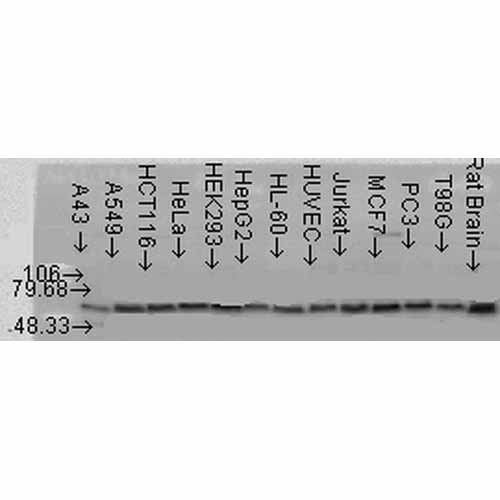Akt2 (PKB beta) Antibody
- SPECIFICATION
- CITATIONS
- PROTOCOLS
- BACKGROUND

Application
| WB, ICC |
|---|---|
| Primary Accession | P31751 |
| Other Accession | NP_001617.1 |
| Host | Rabbit |
| Reactivity | Human, Mouse, Rat, Rabbit, Hamster, Monkey, Pig, Chicken, Bovine, Xenopus, Dog, Sheep, Guinea Pig |
| Clonality | Polyclonal |
| Description | Rabbit Anti-Human Akt2 (PKB beta) Polyclonal |
| Target/Specificity | Detects ~65kDa. Does not react with PKBα (Akt1) or PKBγ (Akt3). |
| Other Names | AKT2 Antibody, PKB Antibody, PKB beta Antibody, PRKBB Antibody, protein kinase Akt2 Antibody, RAC BETA Antibody |
| Immunogen | A five residue synthetic peptide based on the human Akt2, coupled to KLH |
| Purification | Protein A Purified |
| Storage | -20ºC |
| Storage Buffer | TBS, 50% glycerol, 0.09% sodium azide |
| Shipping Temperature | Blue Ice or 4ºC |
| Certificate of Analysis | A 1:3000 dilution of SPC-148 was sufficient for detection of PKBβ in 20 µg of HeLa cell lysate by ECL immunoblot analysis. |
| Cellular Localization | Cytoplasm | Nucleus | Cell Membrane |

Thousands of laboratories across the world have published research that depended on the performance of antibodies from Abcepta to advance their research. Check out links to articles that cite our products in major peer-reviewed journals, organized by research category.
info@abcepta.com, and receive a free "I Love Antibodies" mug.
Provided below are standard protocols that you may find useful for product applications.
Background
Protein kinase B or Akt (PKB/Akt) is a serine/threonine kinase, which in mammals comprises three highly homologous members known as PKB alpha (Akt1), PKB beta (Akt2) and PKB gamma (Akt3). PKB/Akt is a growth-factor-regulated protein kinase which contains a Pleckstrin Homology (PH) domain which might be important for dimerization of the kinase. Binding of phosphoinositide 3-OH kinase products to the pleckstrin homology domain results in translocation of PKB/Akt to the plasma membrane where it is activated by phosphorylation by upstream kinases including the phosphoinoside-dependent kinase 1 (PDK1) and PDK2 (1-3). Myelin basic protein and histone H2B are in vitro substrates for PKB, while glycogen synthase kinase-3 has been implicated as a physiological target (4). Key roles for this enzyme can be found in cellular processes such as glucose metabolism, cell proliferation, apoptosis, transcription and cell migration (1-3).
References
1. Downward J. (1998). Curr Opin Cell Biol. 10(2): 262-7.
2. Brazil D.P., and Hemmings B.A. (2001). Biochem Sci. 26(11):657-64.
3. Nicholson K.M., Anderson N.G. (2002). Cell Signal. 14(5): 381-95.
4. Hardie, G., Hanks, S. (1995). The Protein Kinase Facts Book, Protein-Serine Kinases Academic Press Limited, San Diego, CA 418pps.
If you have used an Abcepta product and would like to share how it has performed, please click on the "Submit Review" button and provide the requested information. Our staff will examine and post your review and contact you if needed.
If you have any additional inquiries please email technical services at tech@abcepta.com.













 Foundational characteristics of cancer include proliferation, angiogenesis, migration, evasion of apoptosis, and cellular immortality. Find key markers for these cellular processes and antibodies to detect them.
Foundational characteristics of cancer include proliferation, angiogenesis, migration, evasion of apoptosis, and cellular immortality. Find key markers for these cellular processes and antibodies to detect them. The SUMOplot™ Analysis Program predicts and scores sumoylation sites in your protein. SUMOylation is a post-translational modification involved in various cellular processes, such as nuclear-cytosolic transport, transcriptional regulation, apoptosis, protein stability, response to stress, and progression through the cell cycle.
The SUMOplot™ Analysis Program predicts and scores sumoylation sites in your protein. SUMOylation is a post-translational modification involved in various cellular processes, such as nuclear-cytosolic transport, transcriptional regulation, apoptosis, protein stability, response to stress, and progression through the cell cycle. The Autophagy Receptor Motif Plotter predicts and scores autophagy receptor binding sites in your protein. Identifying proteins connected to this pathway is critical to understanding the role of autophagy in physiological as well as pathological processes such as development, differentiation, neurodegenerative diseases, stress, infection, and cancer.
The Autophagy Receptor Motif Plotter predicts and scores autophagy receptor binding sites in your protein. Identifying proteins connected to this pathway is critical to understanding the role of autophagy in physiological as well as pathological processes such as development, differentiation, neurodegenerative diseases, stress, infection, and cancer.



